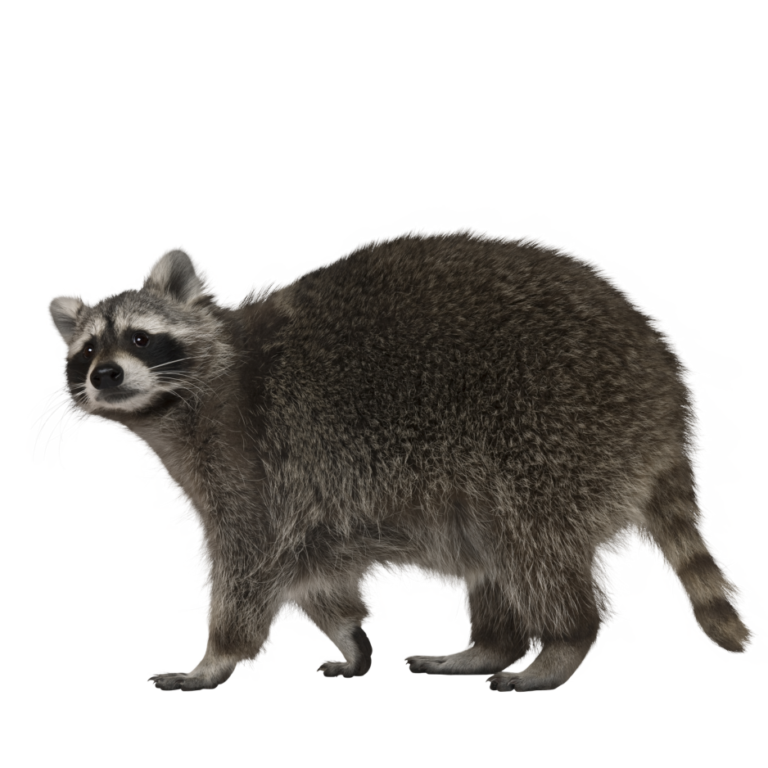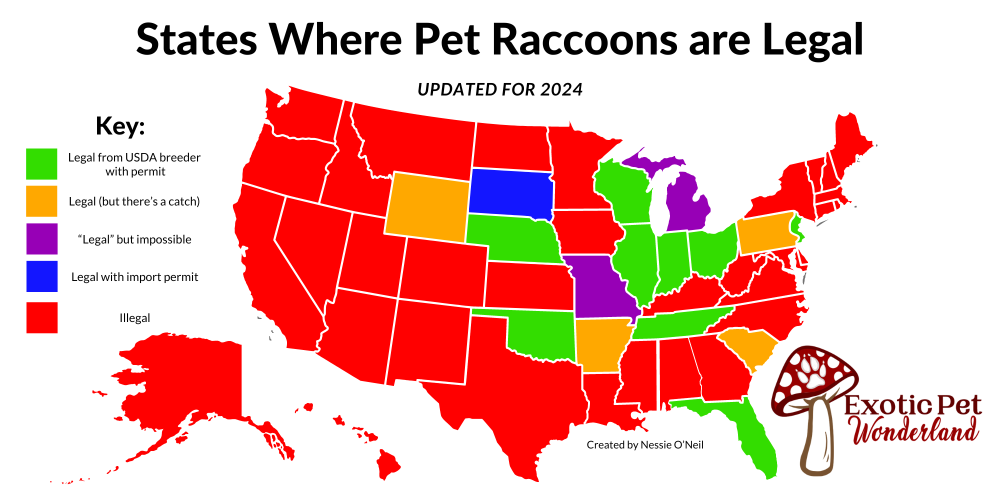
Home » Exotic Pet Care Guides » Pet Raccoon Care Guide
Pet Raccoon Care Guide
Authors: Linsey Hembree and Nessie O'Neil
Raccoons look like cute little teddy bears, but they’re full of mischief and mayhem. You’ve seen pet raccoons trending on social media, but is owning one really what you want? Read on to find out…

Are pet raccoons legal in your state? Similar to foxes, before considering sharing your life with a pet raccoon, you must address the legal aspects of ownership. Pet raccoons are not legal in most places, and capturing a raccoon from the wild to keep as a pet is almost always extremely illegal. It is highly recommended to check with your state, city, and county authorities before considering owning one of these animals. Moreover, if you come across an abandoned or injured raccoon, take it to a licensed wildlife rehabilitator. Do not keep a wild-born raccoon as a pet. Animal Help Now is a useful app to have on your phone in case you encounter wildlife in need.

Once you determine the legality of owning a pet raccoon in your state, you must learn what living with a pet raccoon entails. Raccoons are highly intelligent creatures and should be treated as such. They are also quite stubborn and frequently exhibit moody and aggressive behavior. Owning a raccoon is similar to living with a heavily armed, genius, possessed toddler. Pet raccoons thrive on attention, so confining them and playing with them solely at your convenience does not make them happy. However, raccoons also appreciate having their own time, and you must respect their boundaries. Successfully coexisting with a pet raccoon involves relinquishing some control and finding creative ways to convince them to cooperate, while also childproofing everything to an extreme extent.
Table of Contents

Enclosures for Pet Raccoons
As nice as letting a pet raccoon roam free in your house sounds, it is not always a realistic possibility. While not intentionally destructive, a raccoon’s natural curiosity and playfulness very well be the downfall of many of your prized possessions should you chose to let your pet roam free. Never fear, though, because raccoon enclosures are an option! We would like to make it clear, however, that when we say “raccoon enclosure,” we do not mean a tiny raccoon cage or even a commercial sized catio. For one, raccoons need a lot of room to run and play. They are both incredibly smart and active animals, and prone to obesity in captivity. Keeping your pet raccoon in a cage like that just isn’t fair to them. Instead, raccoon rooms or large outdoor enclosures are perfect choices for when you want a raccoon but don’t want your whole house to look like a tornado has come through. Raccoon rooms and enclosures are also fun to design and give you endless possibilities to keep your raccoon entertained!
Indoor Raccoon Enclosures
When keeping your raccoon inside, it is highly recommended to change the walls in the raccoon room to paneling or something stronger than sheetrock as pet raccoons will pick at sheetrock until they’ve torn holes in the wall.
Also, while pet raccoons are litter trainable, I still wouldn’t use carpet. Raccoons will pick at it and possibly even get their nails hung. As raccoons love spending time with their humans, baby-proofing your entire house is ideal. This especially applies to cabinets and toilets. When you can’t be around to watch, giving your a safe bedroom or even possibly an outdoor enclosure is best. A raccoon room or enclosure is fun place to give them lots of enrichment too. You can build them climbing structures, hanging swings or other toys, and even giving a pond or wheel. Keep in mind though variety is key. Switching out toys from time to time will keep your pet raccoon from becoming bored and destructive.
Since pet raccoons generally litter train pretty easy, a litterbox in the rooms they have access too is also needed. Keep in mind that pet raccoons shouldn’t have regular cat litter. Regular cat litter hurts a raccoon’s sensitive paws and can cause an impaction if they eat it while cleaning themselves. Better alternatives to cat litter are corn cob bedding and pine pellet horse bedding.

Outdoor Raccoon Enclosures
Coming Soon

Pet Raccoon Diets
Raccoons are perfect omnivores, and thus your pet raccoon needs a very specific diet. Raccoons, especially pet raccoons are also prone to obesity. Obesity in raccoons causes several health issues including diabetes, heart disease, and joint problems. Keeping a close eye on your raccoon’s portions is required, along with limiting treats and sugary foods.
Exotic Pet Wonderland feeds a diet that is around 2/3 meat, eggs, and insects and 1/3 fruits, veggies, plant matter, and nuts. They only get lean meats such as poultry, rabbit, and fish with eggs occasionally. As for insects, feeder insects such as crickets, dubias, and meal worms are great for them. Raccoons can eat most fruits, veggies, and nuts.

What can't raccoons eat?
As far as a list of dangerous foods go, there is not a ton of scientifically backed research on what raccoons can and cannot eat. However, high calorie, high sodium, and high sugar foods should be avoided. Cat food is very bad for raccoons and should be avoided at all costs as it can cause kidney issues and, even result in the death of the raccoon.
There are some things that, although there is no research on, we would not risk feeding any raccoons:
Any products containing xylitol
Apricot Pits
Anything with mold on it

Our Raccoons' Favorite Foods
Our raccoons’ favorite foods are, chicken, eggs, sugar snap peas, carrots, cucumbers, roses, crape myrtle petals, chestnuts, and walnuts. Pet raccoons can also eat a low fat, low protein dog kibble, and we will occasionally use that as a treat. Mazuri Omnivore Diet is also a good all around kibble to feed your pet raccoons. This kibble is specially formulated for omnivores like raccoons, skunks, and opossums. Because raccoons vary in size and weight some, we don’t measure out their food too much. We keep our raccoons at a healthy weight by watching the scale and their body condition, and adjusting intake depending on that.
Pet Raccoon Vet Care
Pet raccoons need very specific vet care, and are usually a lot for a vet to handle. For this reason, finding a vet who is well versed in raccoon medicine is crucial.
Raccoon Vaccinations
One of the most important things pet raccoons will need from a vet are vaccines. Raccoons cannot handle a live or modified live vaccine, so all their vaccines must be killed. The main vaccines needed for pet raccoons are- Feline Panleukopenia (distemper for cats), Canine Distemper, Parvovirus, and Rabies.
Rabies Vaccination For Raccoons
The first dose of the rabies vaccine should be given to your raccoon at 16 weeks, and then either annually or every three years depending on if your pet received ImRAB-1 or ImRAB-3.
Parvovirus Vaccination For Raccoons
For Parvovirus prevention in raccoons, the AZA recommends the Parvocine killed univalent parvovirus vaccine.
Distemper Vaccination For Raccoons
As mentioned previously, raccoons cannot have live or modified live vaccines. For this reason, their distemper vaccines must be killed. We recommend the canarypox vectored Purevax Ferret Distemper vaccine by Merial, which we recommend for gray foxes as well.
Flea and Tick Treatment for Raccoons
Pet raccoons can get fleas, but can’t have dog flea preventives. Revolution(not plus, just the original) is safe to keep them flea free. Capstar is also safe to get rid of an infestation of fleas in raccoons.
Spaying and Neutering Raccoons
Pet Raccoons also get quite moody as adults if left. For that reason spaying and neutering is recommended. Spaying or neutering a raccoon under the age of 6 months is not recommended. The University of Iowa recommends 6-8 months as a good age range for sterilization.
De-worming Raccoons
Another very important thing to watch out for are raccoon worms. Pet raccoons need to be wormed frequently and can get Roundworms, Hookworms, and Tapeworms. Raccoon roundworms are transferable to humans and can be very dangerous. For this reason, keeping your pet healthy and safe is a must not only for them, but for you. We worm our raccoons once a month, alternating between Pyrantel pamoate and fenbendazole each month.
Declawing and Defanging Raccoons
If you get a pet raccoon, you can expect to get bit and scratched quite badly. With this in mind, it is never acceptable to declaw or defang a raccoon except in the cases where medically necessary. Medically necessary cases for removing the claws or fangs of a raccoon include things like trauma, severe infection, tumor, or birth defect. If you cannot handle getting bitten or scratched by your pet raccoon and would rather have its claws or fangs removed, please do not get a raccoon in the first place.
Veterinary Care Citations
Sources:
https://assets.speakcdn.com/assets/2332/procyonidcaremanual2010r.pdf
https://dr.lib.iastate.edu/entities/publication/e7129d7b-963c-4320-9ca3-e427362a3cac
Raccoon Enrichment
When exploring raccoon ownership, many people overlook the fact these animals require constant enrichment. Raccoons are highly intelligent and are very destructive when left to their own devices. In the wild, raccoons must search for food, keep their eyes out for predators, climb trees, run, and rely on their senses to survive. When kept in captivity, however, raccoons are relieved of these tasks. As a result, raccoons tend to become obese, destructive, and even aggressive. Providing sufficient enrichment for these remarkable animals poses a challenge, especially considering their intelligence is comparable to many primates.
The types of raccoon enrichment we use at Exotic Pet Wonderland can be broken down into five categories: cognitive, sensory, food, motor, and social.
Click below for more information on raccoon enrichment
Did you enjoy our pet raccoon care guide?
If you enjoyed our care guide, please consider donating! Exotic Pet Wonderland is a nonprofit 501(c)3 animal sanctuary that requires donations to keep our sanctuary running. We work hard to create these care guides, and would like to no longer have to rely on ads to keep our site running. If you are interested in helping us further our goal to provide homes for and educate about captive-bred wildlife, your donation would be greatly appreciated!
More Exotic Pet Care Guides

Phone: 865-236-7596




